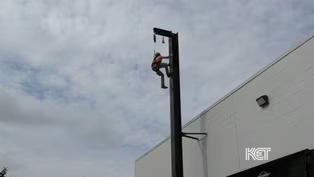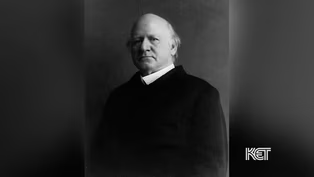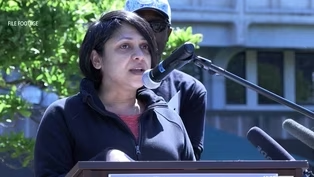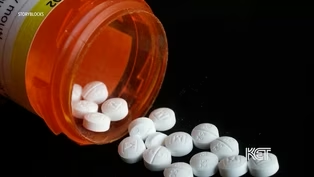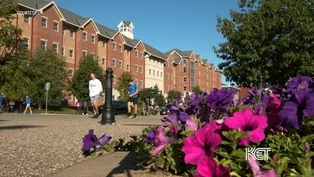
Kentucky's Commissioner of Agriculture on New “Food as Medicine” Program
Clip: Season 3 Episode 4 | 7m 57sVideo has Closed Captions
Kentucky's commissioner of agriculture on new “Food as Medicine” program.
A new partnership between the Kentucky Department of Agriculture and the Kentucky Hospital Association is helping patients, farmers, and taxpayers by providing hospitals with healthier foods.
Problems playing video? | Closed Captioning Feedback
Problems playing video? | Closed Captioning Feedback
Kentucky Edition is a local public television program presented by KET

Kentucky's Commissioner of Agriculture on New “Food as Medicine” Program
Clip: Season 3 Episode 4 | 7m 57sVideo has Closed Captions
A new partnership between the Kentucky Department of Agriculture and the Kentucky Hospital Association is helping patients, farmers, and taxpayers by providing hospitals with healthier foods.
Problems playing video? | Closed Captioning Feedback
How to Watch Kentucky Edition
Kentucky Edition is available to stream on pbs.org and the free PBS App, available on iPhone, Apple TV, Android TV, Android smartphones, Amazon Fire TV, Amazon Fire Tablet, Roku, Samsung Smart TV, and Vizio.
Providing Support for PBS.org
Learn Moreabout PBS online sponsorshipFood as medicine.
That's the idea behind a new partnership between the Kentucky Department of Agriculture and the Kentucky Hospital Association.
The thinking is patients, farmers and taxpayers all benefit when people in hospitals eat healthier foods.
I recently talked about the program with Kentucky's Commissioner of Agriculture, Jonathan Shell.
SCHELL Commissioner Charles, good to see you.
Renee, I am so excited to be back with you.
Yeah, it's always good to be with you.
And we have some other circles that we get to see each other from time to time.
So.
But let's talk about your day job and this interesting initiative that you have about food is medicine.
What do you mean by that?
You know, this conversation has been.
Going on.
Nationally for a long time.
There's some.
Political stuff that goes on with this on the.
Federal level.
But for me, whenever I think.
About healthy living.
Whenever I think about our culture.
I think of food, faith and family.
And so during the campaign, I actually took two.
Really interesting trips.
One then in.
Letcher County.
They've got an.
Amazing farmer's market down there, and.
They do the double.
Bucks program.
And so some of our more vulnerable.
Populations and Medicaid food stamp population, they're able to go.
To a farmer's market, get fresh.
Food, not hobos and Ding Dongs, and they're able to double the amount of dollars that they have at.
The farmer's market.
So if you're going.
In with.
$500 in food.
Stamps, you can get 1000.
Dollars worth to be able to buy and purchase.
Food with it.
To me, that does a couple of things.
One, if we're getting people healthy.
On the front end that are more in vulnerable populations.
We have a chance of getting.
Them back in the workforce.
Two, we're able to.
Save.
Taxpayer dollars on the.
Back end through medical.
Care, through high risk, heart disease.
Diabetes.
Etcetera.
And then the third point is it helps more profitability for the farmers.
So that Letcher County experience was extremely important in the process of building this.
And the second one.
Was with RH.
They have a hospital association that our hospital system down in eastern Kentucky.
Appalachian Regional.
Health and one of their facilities that Kathy Stumbo runs is in Paintsville.
And so they took me down and they wanted to tell me about all of the.
Amazing programs that they're working on.
And they were talking about how they're working with local farmers, how they're working with the local farmers market, how they're trying to get health are fresh, healthier, fresher food.
Inside.
Of their.
Hospital and on post patient care.
So I just started talking to the.
Hospital association to find out what is the opportunity that we have here and what does it actually look like.
And so that's really where this was bred for Kentucky.
Is it's starting out as an association with the hospital Association and the Kentucky.
Department of Agriculture.
And with the candidate for Health.
And Family Services with Secretary Friedland and.
Some of his staff.
We've had.
Conversations.
And this is just the beginning of it.
And so.
If you're watching and you're not.
Involved yet, All right.
We want you to be involved.
And we've got a lot.
Of other partners that we've started working with at UK and other places.
That have similar things going on.
But to me, the three goals that we have initially is to impact in the hospital, specifically.
In three areas the cafeteria.
The vending and post patient care.
And so we want to be able to get.
Fresher, healthier food.
Inside.
The cafeterias.
So that we can kind of.
Control the destiny of our economy here in.
Kentucky.
If we can think.
About how large a consumer of.
Food hospitals are.
Right.
Norton Hospital in.
Louisville, the largest food consumer in.
Louisville.
So that.
Means they're the largest in.
Kentucky.
And if you add all the hospitals in the state of Kentucky, together with the amount of pounds of food that they consume, it could radically change in a positive way.
The agriculture community.
So is there our concern about having it to that scale?
I mean, you're talking about commercial level and would it be more costly because some people think, well, if it's healthier and fresher, usually it costs more.
So we're working on.
Both of those things.
I mean, this is the initial phase.
So we're at ground.
One day one.
And so we're figuring these things that we've got a steering committee that we're going to be working on.
We're going to be traveling around the state.
Talking to.
Interested groups, different farmers, different hospitals, different interest and parties.
And those are some of the things we want.
To work on.
How do we scale up.
A lot of our farming operations that are in the produce right now.
To be able to get to a wholesale level?
Some farmers are scared of that.
They like going direct to consumer, they like going to the farmer's market.
They like selling.
One, two, three, four or.
Five tomatoes.
How do they sell 5000?
Right, Right.
And so that's one of the things that.
We're working on in the Department is how do we.
Get that scalability?
The other part is, is once we get that scalability, the economies of scale is.
Going to bring down that price.
Point.
And what we want to do.
Is not force hospitals or force people.
To have.
To pay for higher food.
What we want to do is to create the.
Atmosphere with.
The infrastructure in the state of Kentucky.
Toward the.
Competitive with.
Local, fresher food.
And we've got some great farmers that are already doing this.
We've got some great farming organizations that are currently working in this.
Space.
That are able to.
Do it in a in a.
In a commercial way.
But at the end of the day, we've got so much looking in the.
Future of how.
Easy this can be.
Just on grabbing some small, low hanging fruit to.
Make an impact.
We don't have to change it.
Completely on the front end.
Right?
We just.
Want to make some progress as.
We go.
Well, as we often have said when we've done programs about healthier eating and lifestyles, if you can make the the best choice, the easy choice.
Yes, right.
So that's you know, not to say that hospitals would no longer carry a hamburger.
Right.
But then if you have availability of these other options, perhaps that becomes a choice they make instead.
Well, now we might want them still have hamburgers.
They do form a.
Locally grown content.
Right?
They don't want to change them again.
That's right.
Right.
So the next phase of this is what you kind of alluded to, what you're doing now.
So we.
Sent out a survey to.
All of the hospitals in the state of Kentucky in hospital systems, and we got back about.
50.
Responses, which when you think about it, that's.
A large number of responses.
That we got because many of them, our hospital systems where they have multiple hospitals across the state and they submitted one.
Answer or one one answer to the survey.
And we found out a lot of good information that we'll compile and put out eventually on some of the.
Things that we're working on.
But what.
We wanted to know was.
Is who's your distributor currently for your food services?
Who do you work with currently.
So that maybe we can get into that system?
Maybe that's the quickest entry point.
A couple of the things that we asked.
Was, what's your highest.
Month of food consumption?
How many pounds do you consume?
What types of food you consume?
Do you have somebody dedicated.
To working with local farmers.
Or can you get someone dedicated.
To working with local farmers to do that food entry?
And so that survey gave us a lot of really good information that we're going to.
Be able to take.
To the group.
That we're going to be able to take back to the ag community and.
Really figure.
Out how do we how do.
We merge this together.
And one of the ways that we're going to do that.
Is through the.
Steering committee.
Meetings that we're going to have across the state.
And we're going to bring in interested parties, farmer groups, health care groups.
People that can help.
Have the conversation.
To where we can find solutions for this.
And those are really the first two steps that we're going to take hopefully this year, a little bit later on in the summer.
The Post The Post hospital experience, though, maintaining, yes, perhaps a habit that they may have started while they were in hospital care.
Once they are released and at home, that's an interesting kind of concept.
Well, when you think about.
Some of our more vulnerable.
Populations from the hillside, it's usually going to be.
Some of our more poorer citizens.
In the state.
And so a lot of those are going to be on Medicaid, they're going to be on the food stamp system.
And so what we're looking at is how do we do food boxes, some of those kind of things?
How do we teach them how.
To cook better at.
Home?
How do we.
Give them the resources to.
Be able to do that?
And then even on the.
Other side of maternity.
Boxes.
Mothers.
Going home with babies about how do you cook.
For you as a mother, and then how do you cook for your children later on.
In a family setting?
And so there's there's several different.
Aspects and avenues that we can.
Go through.
To be able to help make an impact in this.
And the way that I look at this is that the healthy.
Kentucky's a strong Kentucky.
And the healthier that we can.
Make some of our more vulnerable.
Citizens.
The better it's going to be for everybody.
And you know.
From a conservative.
On this point.
The three.
Main points that I look at is we can get people healthy.
Back in the workforce to impact workforce security.
And we can also save money on the back end.
On taxpayer dollars if.
We get people.
Healthy on the front end.
And so this investment.
That we're trying to.
Make with hospitals, insurance companies, state government, federal government, I think will pay dividends into the future.
When you look at a return on.
Investment for the activity that we're.
Going to try and.
Accomplish.
Well, we'll have you back again to report on the progress and other items that you're working on.
It's always a pleasure.
Commissioner Michelle, good to see you.
Thank you very much.
Apprenticeship program Looking to Fill the Need for More Iron Workers in the State
Video has Closed Captions
Clip: S3 Ep4 | 4m 1s | Apprenticeship program looking to fill the need for more iron workers in the state. (4m 1s)
Current, Former Attorneys General Pay Tribute to John Marshall Harlan
Video has Closed Captions
Clip: S3 Ep4 | 2m 42s | Current, former attorneys general pay tribute to John Marshall Harlan. (2m 42s)
Kentucky Supreme Court Hears Arguments in Challenge to State Representative’s Candidacy
Video has Closed Captions
Clip: S3 Ep4 | 2m 27s | Kentucky Supreme Court hears arguments in challenge to state representative’s candidacy. (2m 27s)
New Numbers Show Drug Overdose Deaths Down Almost 10% in Kentucky
Video has Closed Captions
Clip: S3 Ep4 | 1m 39s | New numbers show drug overdose deaths down almost 10% in Kentucky (1m 39s)
Statewide Campaign Helping Students Get Financial Aid after Delayed Rollout of FAFSA
Video has Closed Captions
Clip: S3 Ep4 | 3m 18s | Statewide campaign helping students get financial aid after delayed rollout of FAFSA. (3m 18s)
Providing Support for PBS.org
Learn Moreabout PBS online sponsorship
- News and Public Affairs

Top journalists deliver compelling original analysis of the hour's headlines.

- News and Public Affairs

FRONTLINE is investigative journalism that questions, explains and changes our world.












Support for PBS provided by:
Kentucky Edition is a local public television program presented by KET
